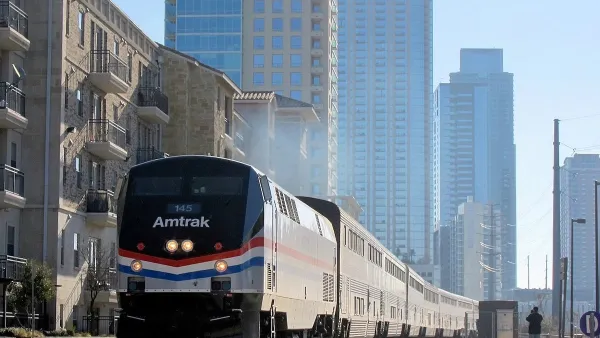Eric Jaffe pushes back on the Republican Study Committee's proposal to cut over $6 billion in rail funding over the next ten years.
While conceding that cuts must be made to federal transportation funding, Jaffe and other transit advocates worry that the Committee's proposal places an unfair burden on rail.
Jaffe says proposal supporters' argument that rail requires significantly more in subsidies than roads fails to account for the full social costs of each transportation mode, such as environmental impacts and money and time lost to congestion. Furthermore, Jaffe argues, making the initial investment required to create a comprehensive rail network will likely reap long-term benefits even if it seems unprofitable in the short-term, as did the initial investment required to construct the nation's highway system.
Jaffe writes:
"None of this is to say the federal government should not cut back its rail and transit spending. All right, so it is. But more critically, it's a reminder that we do, in [proposal supporter Bob Poole's] words, 'need to be clear' about the full benefits of balanced transportation, even when that clarity demands an inconvenient degree of subtlety."
FULL STORY: Why Cutting Rail Funding Would Hurt America’s Transportation Future

Planetizen Federal Action Tracker
A weekly monitor of how Trump’s orders and actions are impacting planners and planning in America.

Maui's Vacation Rental Debate Turns Ugly
Verbal attacks, misinformation campaigns and fistfights plague a high-stakes debate to convert thousands of vacation rentals into long-term housing.

Restaurant Patios Were a Pandemic Win — Why Were They so Hard to Keep?
Social distancing requirements and changes in travel patterns prompted cities to pilot new uses for street and sidewalk space. Then it got complicated.

In California Battle of Housing vs. Environment, Housing Just Won
A new state law significantly limits the power of CEQA, an environmental review law that served as a powerful tool for blocking new development.

Boulder Eliminates Parking Minimums Citywide
Officials estimate the cost of building a single underground parking space at up to $100,000.

Orange County, Florida Adopts Largest US “Sprawl Repair” Code
The ‘Orange Code’ seeks to rectify decades of sprawl-inducing, car-oriented development.
Urban Design for Planners 1: Software Tools
This six-course series explores essential urban design concepts using open source software and equips planners with the tools they need to participate fully in the urban design process.
Planning for Universal Design
Learn the tools for implementing Universal Design in planning regulations.
Heyer Gruel & Associates PA
JM Goldson LLC
Custer County Colorado
City of Camden Redevelopment Agency
City of Astoria
Transportation Research & Education Center (TREC) at Portland State University
Jefferson Parish Government
Camden Redevelopment Agency
City of Claremont





























